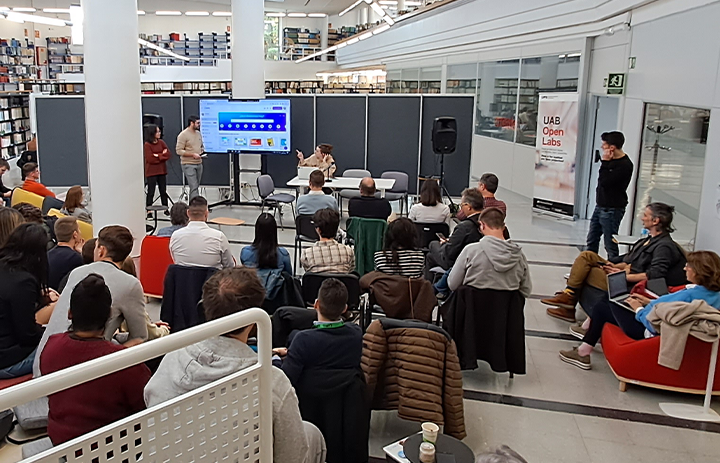Six projects propose solutions to campus challenges in the "Open Lab Campus" programme

Reducing the campus' environmental impact, improving food models and placing the UAB as a leader in innovation are some of the challenges participants worked on in the "Open Laboratory Campus: co-creating solutions in a smart campus" programme.
11/01/2024
The "Open Laboratory Campus: co-creating solutions in a smart campus" programme ends after three months of working with co-creation and open innovation methodologies to develop projects that can improve the UAB campus. A total of 31 persons participated, mainly students, lecturers and technical staff, and administration and management personnel, who created multidisciplinary groups that came up with proposals that could improve the sustainability, food, mental health, and visibility of the University.
On 20 December 2023, the participants presented their projects in front of a jury made up of Ivan Martínez, deputy executive administrator of research at the UAB; Alicia Bosch, president of the University-Business Committee of the Social Council; Lídia Aguilera, head of the Business Collaborations Unit of the UAB Parc de Recerca; and Oriol Vicente, head of the Strategic Development Unit at the UAB.
The prize for the best idea, which included a cash prize of 5,000 euros, was awarded to the project conducted by Sergi Garriga, Arnau Gómez, Sergi Tordera, Roger Vera and Gabriel Gausachs, which proposed improving the UAB's catering system by applying new technologies in collaboration with the campus restaurants. The project proposes including a tab in the new UAB mobile app with information on the different cafeterias and restaurants on campus and the products they offer. The project also proposes integrating a way to prevent food waste by working with the Too Good to Go platform, thereby fostering more sustainable practices and providing benefits for consumers and for restaurants.
Three other projects presented ways to reduce waste generated on campus and improve its sustainability, such as installing a reusable lunch-box service to replace single-use containers for the cafeterias' take-away food, a prototype for the usage and recycling of organic waste material for food production, and the application of a biodegradable method for polypropylene. Another project aimed to improve the information students receive on University services through the creation of an artificial intelligence tool that encompasses all of the information about the UAB that students need, containing an inclusive and feminist approach dedicated to creating synergiess. Lastly, the programme also served to develop a project which would implement challenge-based learning methodologies throughout the UAB.
During the programme, each project included the support and guidance of a teamcher, an expert in the area who coordinated and encouraged the group to work with challenge-based learning, research, and innovation methodologies. “The objective of this initiative is to get the university community involved in the co-creation of projects which can be applied locally and thereby reinforce the role of the UAB campus as a living lab, in an ideal location in which they can develop and experiment with new solutions, products and services in collaboration with other users and relevant stakeholders”, explains Oriol Vicente, coordinator of the programme.
The "Open Laboratory Campus" programme was funded by the UAB Social Council and carried out by the UAB Strategic Development Unit and Challenges Office, and included the collaboration of various vice rectors, offices and units, who were in charge of promoting the challenges, as well as monitoring and evaluating them.
This information is related to the following SDG
Life on land
Decent work and economic growth
Good health and well-being
Peace, justice and strong institutions
Industry, innovation and infrastructure
Gender equality
Affordable and clean energy
Quality education
Responsible consumption and production
Sustainable cities and communities
Partnerships for the goals
Climate action